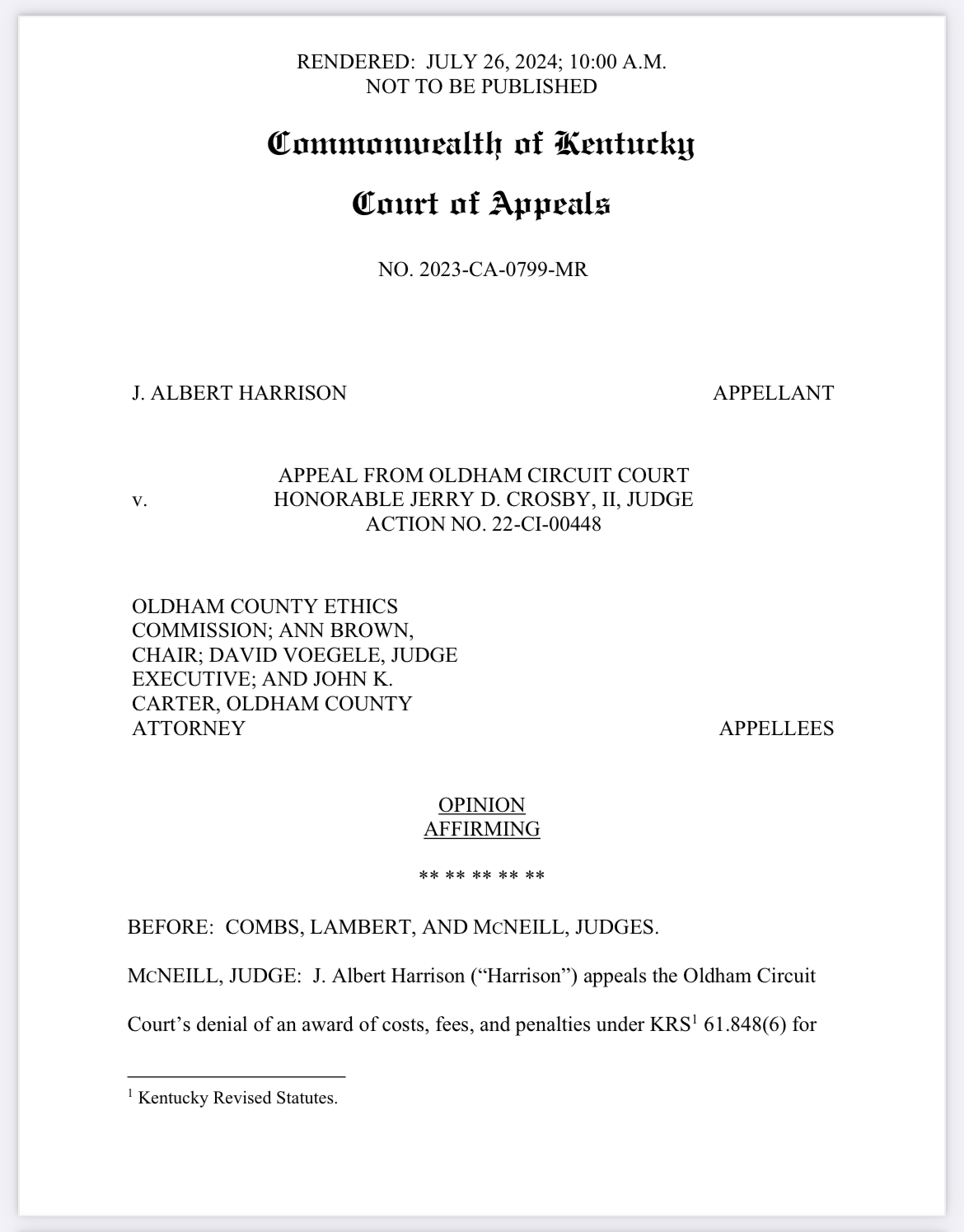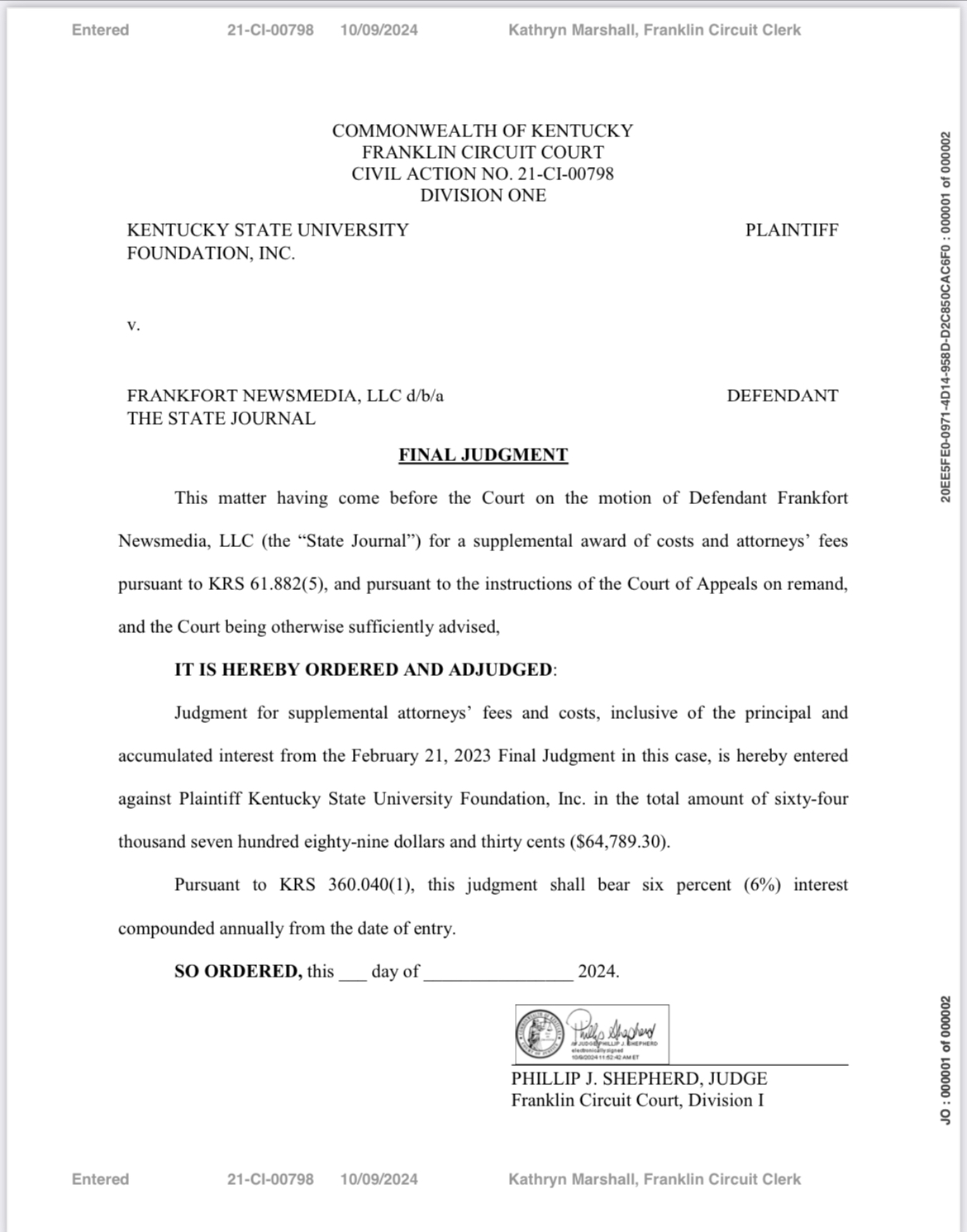

Welcomed news from Kentucky's courts in two open government cases. Congratulation to the parties and their legal counsel, Kentucky Open Government Coalition co-director, Jeremy Rogers, who, along with co-counsel, Suzanne Marino, crossed the finish line in two important wins.
ALBERT HARRISON v OLDHAM COUNTY ETHICS COMMISSION
This one nearly escaped our notice, but it is immensely important as a vindication of decades of Attorneys General open meeting decisions -- not to mention opinions of the courts -- recognizing that the requirements for conducting closed sessions in a public meeting are mandatory -- and not, as former Attorney General Daniel Cameron erroneously determined, voluntary.
https://www.ag.ky.gov/Resources/orom/2022/22-OMD-187.pdf
On July 25, the Kentucky Court of Appeals affirmed Oldham County Circuit Court Judge Jerry Crosby's opinion in Albert Harrison v Oldham County Ethics Commission.
http://opinions.kycourts.net/COA/2023-CA-000799.PDF
The court opined:
"The circuit court ruled the Commission violated the OMA: (1) by failing to include an agenda in its notice of the special meeting (KRS 61.823(3)); (2) by failing to identify the reason for, and statutory provision authorizing, a closed session (KRS 61.815(1)(a)); and (3) by taking final action during a closed session (KRS 61.815(1)(c)), and remanded the matter for the Commission to conduct a meeting in accordance with the OMA.
"However, the court declined to award costs, attorneys' fees, and penalties under KRS 61.848(6), finding the Commission's violations were not willful. The circuit court looked to case law
interpreting the substantially similar provision in the Open Records Act and held that for a violation to be willful, there must be evidence of bad faith. It concluded Harrison had presented no evidence of either willfulness or bad faith."
In a contemporaneous post, the Kentucky Open Government Coalition observed:
"Judge Crosby ruled that the local ethics commission’s failure to observe the requirements for conducting a closed session -- specifically the requirements that it give notice to the public of the statutory basis for a closed session and that it take final action in open session -- violated the open meetings law.
Cameron’s 2022 decision determined that although the ethics commission failed to comply with the open meetings requirements for closed session, the commission’s noncompliance did not violate the open meetings law. His decision ignored over four decades of caselaw and Attorney General decisions.
"The decision would have permitted members of a public agency to convene a public meeting, retire to closed session, exit the open meeting without legal explanation — leaving the public to wonder what the members were discussing behind closed doors — and return some time later for the purpose of adjournment, having taken final action in closed session.
"The Oldham Circuit Court rejected this affront to forty plus years of precedent, agreeing with Harrison that Cameron’s 'overly simplistic interpretation of [the statute] would effectively gut the Open Meetings Act.'"
https://kyopengov.org/blog/why-oldham-circuit-court-reversal-daniel-cam…
https://kyopengov.org/blog/precedent-over-policy-preference-how-oldham-…
The Court of Appeals affirmed Judge Crosby's finding of insufficient evidence of willfulness to support Harrison's request for attorneys' fees and cost. It left undisturbed the lower court's analysis.
The case is designated "Not to be Published." This means that it can be cited since it was rendered after January 1, 2003, and there is no published opinion that addresses the issue.
It is useful for any subsequent court's consideration.
Kentucky's Rules of Appellate Procedure (RAP) 42 (https://govt.westlaw.com/kyrules/Document/N860C8B9085B411ED9DCDC96565D7…))
(https://search.app/uvVBnxM9BY4mvBih9))
KENTUCKY STATE UNIVERSITY FOUNDATION, INC. v FRANKFORT NEWS MEDIA d/b/a THE STATE JOURNAL
In a "Final Judgment" issued on October 9, the Franklin Circuit Court awarded The State Journal $64,789.30 in attorneys' fees and costs in a case affirming the public's right of access to public university foundation records.
Kentucky State University Foundation exhausted all appeals in it's doomed battle to exclude itself from the open records law -- notwithstanding decades of legal authority determining that the KSU Foundation is a public agency for open records purposes. That protracted legal battle yielded no Foundation gain -- except, perhaps, to forestall the inevitable -- and came at a significant loss for a public agency whose funds are intended to support the mission of the university rather than pursue fruitless legal action.
https://kyopengov.org/blog/supreme-court-reaffirms-public-university-tr…
https://kyopengov.org/blog/kentucky-state-university-dissolves-relation…
It is one of the clearest examples of a public agency whose skewed priorities -- in relation to transparency and accountability -- comes at a significant cost both reputationally and financially.


